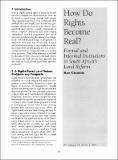| dc.contributor.author | Cousins, Ben | en |
| dc.date.accessioned | 2016-02-24T15:23:34Z | |
| dc.date.available | 2016-02-24T15:23:34Z | |
| dc.date.issued | 01/10/1997 | en |
| dc.identifier.citation | Cousins, B. (1997) How Do Rights Become Real?: Formal and Informal Institutions in South Africa's Land Reform. IDS Bulletin 28(4): 59-68 | en |
| dc.identifier.issn | 1759-5436 | en |
| dc.identifier.uri | https://opendocs.ids.ac.uk/opendocs/handle/20.500.12413/9189 | |
| dc.description.abstract | Summary Central components of South Africa's post?apartheid land reform comprise ambitious and wide?ranging ‘rights?based’ laws and programmes. But how do legally defined rights to resources become effective command over those resources? And what are the limits to social change through legal reform? Two central issues which arise are: supplementing the passing of new legislation with the detailed design of programmes to implement these laws, and the interplay of formal and informal institutions in the complex social arenas within which people actually live. Both centrally involve issues of power, authority and contestation, and require us to consider law as only one source of rule?making in society. The environmental entitlements framework helps us to explore these questions. | en |
| dc.format.extent | 10 | en |
| dc.publisher | Institute of Development Studies | en |
| dc.relation.ispartofseries | IDS Bulletin Vol. 28 Nos. 4 | en |
| dc.rights.uri | http://www.ids.ac.uk/files/dmfile/IDSOpenDocsStandardTermsOfUse.pdf | en |
| dc.title | How Do Rights Become Real?: Formal and Informal Institutions in South Africa's Land Reform | en |
| dc.type | Article | en |
| dc.rights.holder | © 1997 Institue of Development Studies | en |
| dc.identifier.doi | 10.1111/j.1759-5436.1997.mp28004007.x | en |

